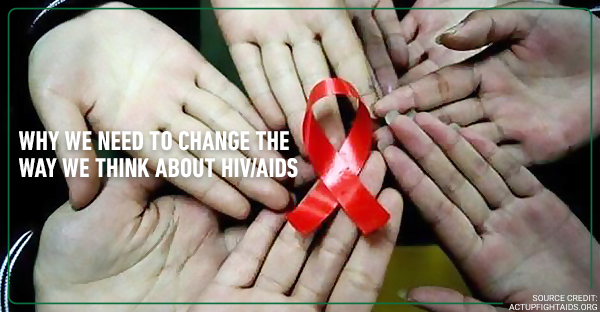Being Aware vs Being Sensitised - Tackling the HIV/AIDS issue

On World AIDS day, we asked people a simple question on our social platforms - “What would you do if you got to know that your friend is HIV positive or has AIDS?”
Here are some of the responses we received -
“Spread this news in school/college. Start making a distance from him/her.”
“My first reaction will be, ‘Bhai condom ke paise nahe the to mujhse le”
“Ask him for some blood.. I've some scores to settle #ColdRevenge”
While AIDS awareness has been a major agenda all over the world, these responses made us think that we as a society need to first rethink the way we address someone who is living with the HIV infection or AIDS. Our attitude leads to their ostracisation, and we become a major source of depression among people in the community. Evidently, awareness about AIDS/HIV is just not enough, and there is a drastic need for the shift in our mentality to show our solidarity to the AIDS/HIV community.
To know how to bring about this shift in mentality, we spoke with Nived Nambiar (an AIDS awareness activist) and here’s what he had to say:
Difference between HIV and AIDS
HIV is a virus that causes infection, AIDS is a condition developed by the severe immune destruction due to HIV virus.
HIV (Human Immunodeficiency Virus) is a subgroup of retrovirus that causes HIV infection. Progressive failure of our body’s immune system (if left untreated for years) allows life-threatening infections and cancer to thrive, this condition is called AIDS (Acquired Immunodeficiency Syndrome).
Ever since the virus dreadfully made its presence felt in the world in 1980’s, HIV has infected, 37 million people in the world (WHO).
Reasons behind stigma against the HIV / AIDS
Click here to read more about the stigmas related to HIV infections / AIDS
Earlier, there was almost no awareness regarding the prognosis of the disease, and medical treatment was absent to control the viral activity. This resulted in unfortunate stigmatization and added immense pressure on people living with HIV/AIDS (PLWHA) to conceal their status to anyone. Things have changed now with medical discoveries, but the stigmas remain.
When we hear HIV or AIDS, we only have one word to associate it with - Sex. We have kind of set our mind that HIV cannot be transmitted through any mode other than sex, and it seems like we have taken an ownership for this inappropriate ideology.
Stigma is also associated with hesitation to get subjected to mandatory HIV testing, it almost sounds like an ‘abuse’ when one is insisted to undergo testing. This report on hand comes with the fear of being detected positive and feeling endangered about the consequences he/she could face.
How to overcome stigmas against HIV / AIDS
Awareness is the key to combat HIV because ignorance, followed by stigma holds the potential to kill the survivors psychologically killing their strength.
1. Know the right language or the right terms
The first step is to break the bad language and emphasize on using right terms. An individual suffering from the disease is a ‘Person living with HIV/AIDS’ or a ‘HIV/AIDS survivor’, we must address them positively. ‘HIV Patient’ or ‘AIDS patient’, ‘AIDS victim’ must be avoided to maximum level as it only creates negativity, affecting their psychological well being.
2. Know what happens when someone has AIDS
HIV survivor dies of/from AIDS-related diseases and not because of AIDS. Like I mentioned earlier, AIDS is an advanced stage that involves severe immune system destruction making the survivor extremely vulnerable to opportunistic life-threatening infections that causes death ultimately.
3. Know how HIV is transmitted
HIV is transmitted via:
Unprotected (or condomless) sexual activity between partners (both Heterosexual and Homosexual).
Through Placenta from Infected mother to fetus.
Using infected hypodermic needles.
Drug overuse.
HIV is not longer a deadly disease
Survivors with successful HIV treatment on regular basis have shown undetectable viral load on their body fluids, which means that the viral activity is under-control and less likely to transmit. In fact, there are discordant couples (where one partner is HIV-infected and other is not) who are living a regular life. People living with HIV/AIDS shouldn’t be judged for their HIV status, neither should the theory of their possible infection be a subject of discussion.
Psychology always affects physiology.
When a body is stressed or experiences a negative atmosphere, it affects the body’s immune system making the body weak and develop symptoms in the form of headaches, body aches, mood swing and in extreme cases, chronic depression. It is the same with people living with the HIV infection or AIDS. Imagine how amazing their life would turn out to be if they received positive vibes from a supportive society.
What are some of the ways in which we can remove the social stigmas related to people living with HIV infections and AIDS? Write to us at jaagorein@gmail.com or on Facebook, or tweet to us at @JaagoRe.
Disclaimer:
Views expressed here are of the author alone and do not necessarily represent that of the brand.
Sources:
Wikipedia
About the Author:
Share this story on






